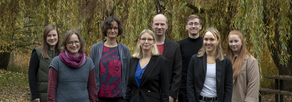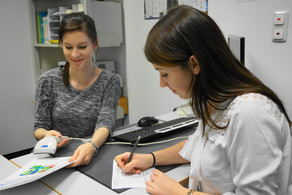Sample of the study
The single parent questionnaire was completed by a total of 923 single mothers, who were at an average age of about 38 years(M = 38.37 years, SD = 7.05 years). 27.7% of them were younger than 35 years old, almost half were between 35 and 44 years old (48.3%), and 23% were 45 years old or older.
Most mothers were of German nationality (90%), 4.6% were from Switzerland and 2.2% from Austria (other nationality: 2.3%, missing data on nationality: 0.9%).
As the highest educational qualification, 43.7% stated a technical or university degree, 24.2% had the (technical) high school diploma and 23.1% a secondary school diploma. 4.6% of them obtained a lower secondary school leaving certificate and 0.5% stated that they had no qualification (other qualification: 3.5%, missing information on educational attainment: 0.5%).
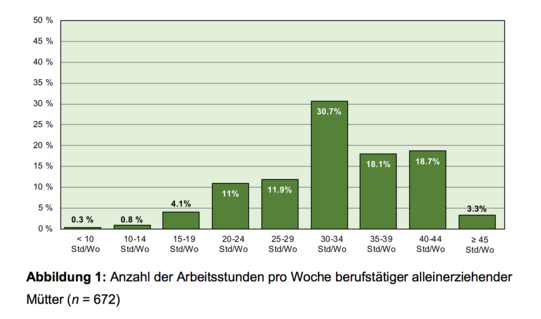
Almost three-quarters of the single mothers were employed (72.8%) with an average number of hours worked per week of 31.74(SD = 7.78 hours/week). The distribution of the number of hours worked per week can be seen in Figure 1. It can be seen that 10.9% of working single mothers work less than 20 hours per week, more than half of them work between 20 and 34 hours per week (53.6%) and 40.1% work 35 hours or more. 8.9% of the single mothers stated that they were unemployed, 8.5% stayed at home as a housewife or were on maternity/parental leave, and 5.3% were in education, training, or studying (other employment situation: 2.7%, missing information on employment situation: 0.7%).
In the questionnaire, the single mothers were asked about their current marital status. As shown in Figure 3, about half of them reported being single (51.8%), 32.7% were divorced(M = 4.69 years, SD = 4.22 years, n = 302), 11.6% were currently living separately from their partner(M = 2.38 years, SD = 1.87 years, n = 107), and 2.2% were widowed(M = 5.12 years, SD = 4.53 years, n = 20) (missing information on marital status: 1.1%). One-fifth of the single mothers were living in a new partnership (20.7%) and a total of 5.4% were living in a shared household with their new partner. The participating mothers had been single mothers for an average of 5.39 years(SD = 3.96 years). 23.5% had no contact at all with the father of their child/children, 24.2% rarely, 26.5% occasionally, and 22.3% frequently (missing data on contact with ex-partner: 3.5%). The relationship with the ex-partner was described by 5.3% as very good, 26% as rather good, 32.6% as rather bad and 31.9% as very bad (missing data on the relationship with the ex-partner: 4.2%).
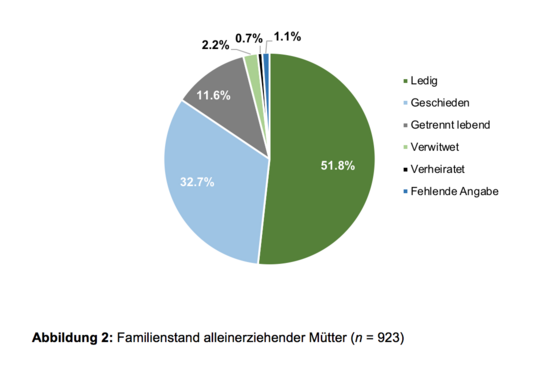
Participating mothers provided information on their children's age, gender, disability, and living situation. On average, the mothers had 1.54 children(SD = .80 children). The majority of them had one child (60.5%), 28.9% had two children, and 10.6% of them had three or more children. 20% of the single mothers reported that they had at least one of their children with a disability, mental impairment, or chronic illness. Table 1 shows the distributions of the characteristics age (in years), gender and disability for children 1 to 6, respectively.
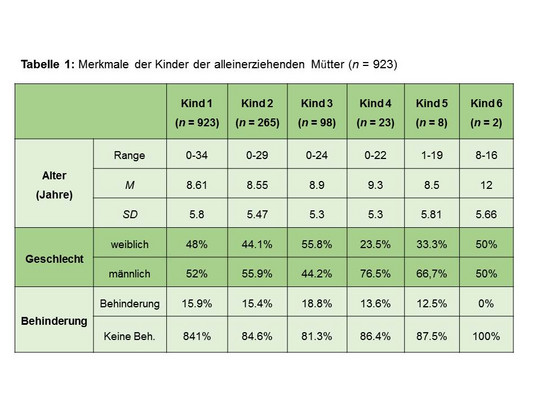
The mothers surveyed were asked to indicate which support measures they regularly make use of (see Table 2). A distinction was made between internal, external and therapeutic support. Among the internal supports, family (60%) and friends (31%) were named for the most part, but also the father of the child/children (19.5%) or the new partner (11.2%). 22% of mothers reported receiving no internal support. External support instances included therapy services, which 36.3% of the single mothers took advantage of, support through childcare (31.9%) or also in the household (9%) (No external support: 39.2%). Therapeutic support was again asked more specifically, with 28.7% reporting attending psychotherapy, 21.8% receiving support from a parenting center, 6.4% finding support in self-help groups, and 5.4% in parenting classes. The majority received no therapeutic support (63.7%).
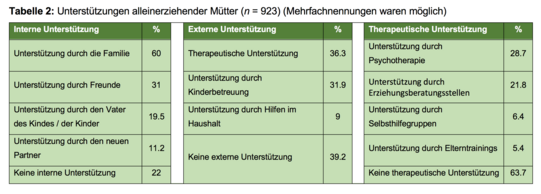
Contact: Teresa Sartor, M. A. E-Mail: teresa.sartor@tu-dortmund.de Supervisors: Prof. Dr. Heinrich Tröster Dr. Sarah Lange(sarah.lange@tu-dortmund.de)
Back to the EBI

